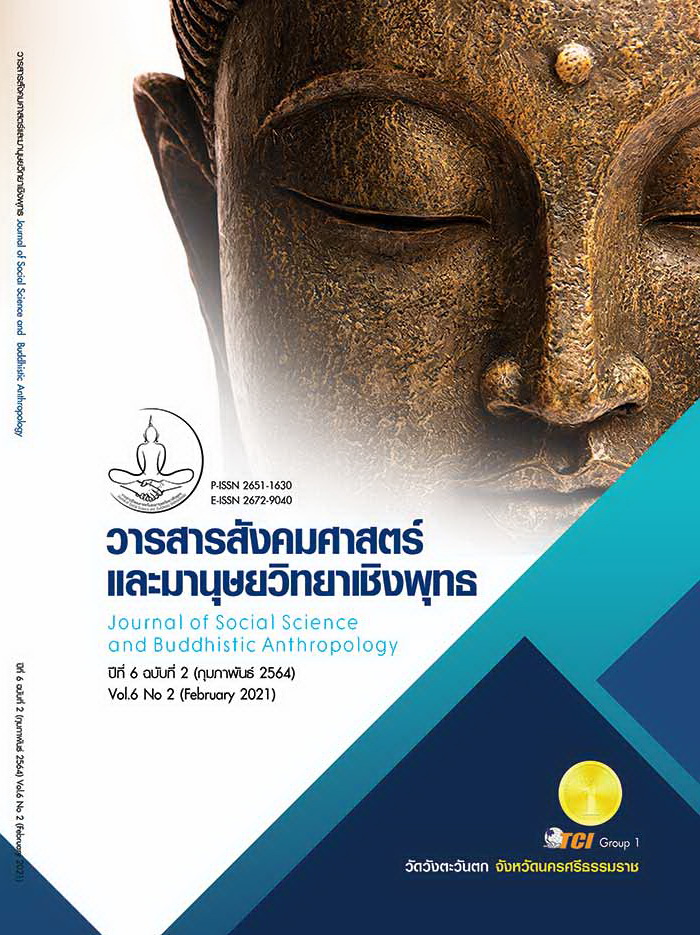WOMEN AND NATURE IN CONTEMPORARY THAI NOVELS ECOFEMINIST APPROACH
Keywords:
Women, Nature, Contemporary Thai Novels, EcofeminismAbstract
The Objectives of this research article were to analyze the women - nature connections in literary works, based on ecofeminism approach and the influence of the theory on literary works to the five Thai literary works produced by the outstanding female writers during the years 2513 B.E. to present: Jintawee Wiwat (2513 – 2523 B.E.), Krisana Asoksin (2524 – 2534 B.E.), Kaew Kaw (2535 – 2545 B.E.), Ngarmpun Vejjajiva (2546 – 2556 B.E.), and Veeraporn Nitiprapha (2557B.E. to present). The study found that women in Thai literary works were connected to nature and could be analyzed by an ecofeminist conceptual framework of 1) historical connections 2) conceptual connections 3) empirical connections 4) symbolic connections 5) political connections 6) ethical connections 7) scientific connections, and 8) cross cultural connections. From women-nature connections in these literary works, the researcher categorized it into two groups: the individualist and sexuality: nature gender power relations. Thai literary works illustrated ecofeminist concept influencing the connection between sexism by men and the discrimination of nature. These were expressed through the dualism and anthropocentrism conceptual connections through interpretation of connotative meaning in patriarchy society.
References
ไชยรัตน์ เจริญสินโอฬาร. (2560). วาทกรรมการพัฒนา. (พิมพ์ครั้งที่ 6). กรุงเทพมหานคร: วิภาษา.
ธัญญา สังขพันธานนท์. (2553). วรรณกรรมวิจารณ์เชิงนิเวศ: วาทกรรมธรรมชาติและ สิ่งแวดล้อมในวรรณกรรมไทย. ใน ดุษฎีนิพนธ์ปริญญาดุษฎีบัณฑิต สาขาวิชาภาษาไทย. มหาวิทยาลัยนเรศวร.
โศภิษฐ์ สุ่มมาตย์. (2556). ผู้หญิงและธรรมชาติในนวนิยายถ่ายเถา สุจริตกุล: ทฤษฎีสตรีนิยมเชิงนิเวศ. ใน วิทยานิพนธ์ศิลปศาสตรมหาบัณฑิต สาขาวิชาภาษาไทย. มหาวิทยาลัย ขอนแก่น.
Amin, N. R. (2015). Interweaving the threads of ecofeminism and reviving the theory through a comparison of two cross-cultural novels (Order No. 1592804). Available from ProQuest Dissertations & Theses Global. (1708652859). Retrieved March 30, 2020, from https://search.proquest. com/docview/1708652859?accountid=27797
Berthoud-Jury, J. (2014). Environmental justice and paradigms of survival: Unearthing toxic entanglements through ecofeminist visions and indigenous thought (Order No. 3685403). Available from ProQuest Dissertations & Theses Global. (1666454320). Retrieved March 30, 2020, from https://search.proquest.com/docview/1666454320?accountid=27797
Devine, M. (1992). Woman and Nature: Literary Reconceptualization. London: The Scarecrow Press.
Donovan, J. (2008). Feminism and the treatment of animals : from care to dialogue. In Susan J. Armstrong & Richard George Botzler (eds.). The Animal Ethics Reader: Routledge.
Gaard, G. (2010). Strategies for a Cross-Cultural Ecofeminist Literary Criticism. Ecozon@ , 1(1), 47-52.
Haraway, D. J. (1991). A Cyborg Manifesto: Science Technology and Socialist Feminism in the Late Twentieth Century. London: Routledge.
Merchant, C. (1980). The death of nature: Women ecology and the scientific revolution. London: HarperCollins Publishers.
Najera, M. (2018). Nature as feminine: An eco-feminist reading of selected latin american narrative (Order No. 10827098). Available from ProQuest Dissertations & Theses Global. (2117678056). Retrieved March 30, 2020, from https://search.proquest.com/docview/2117678056?accountid=27797
Warren, J. K. (1993). Introduction to ecofeminism. In Zimmerman, Michael E. Callicott J. Baird,Sessions, George. Warren, Karen J. and John Clark (Eds.), Environmental Philosophy: From Animal Rights to Radical Ecology. Englewood Cliffs, NJ: Prentice-Hall.
Warren, J. K. (2007). Ecofeminism: Women Culture Nature. Bloomington and Indianapolis: Indiana University Press.









